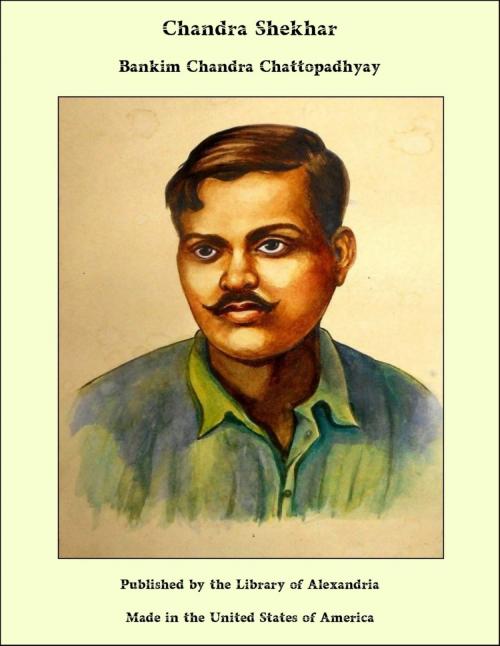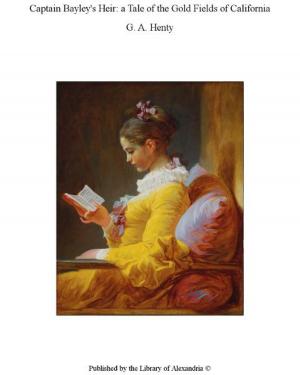| Author: | Bankim Chandra Chattopadhyay | ISBN: | 9781465615299 |
| Publisher: | Library of Alexandria | Publication: | March 8, 2015 |
| Imprint: | Language: | English |
| Author: | Bankim Chandra Chattopadhyay |
| ISBN: | 9781465615299 |
| Publisher: | Library of Alexandria |
| Publication: | March 8, 2015 |
| Imprint: | |
| Language: | English |
ON the bank of the Ganges, there was seated a boy under the green mantles of the mango groves, enjoying the evening melody of the flowing Bhagirathi.* Under his feet lay, on the green bed of grass, a little girl, casting upon his face her lingering glances—silent and motionless. She was gazing untiringly, and turning for a while her eyes towards the sky overhead, the river below, and the trees around, again fixed them upon that face. The name of the boy was Pratap—that of the girl, Shaibalini. Shaibalini was then only a girl of seven or eight—Pratap had scarcely stepped into youth. Overhead, the Papia, in its airy flight, filled the sky with waves of music and smoothly glided off.Shaibalini, in imitation, began to thrill, with her whistles, the mango groves that adorned the bank of the Ganges. The murmuring melody of the river mingled with that mock music in perfect harmony. The girl with her little soft hand plucked some equally soft wild flowers, and making with them a garland, embellished the boy with it. Taking it off, she coiled it round her own braid and again put it on the neck of the boy. She could not decide which of them should wear it. At last she got over the difficulty by throwing it round the horns of a plump, nice-looking cow grazing near by. So it happened with them often. Sometimes the boy, in return for the garland, used to bring down for her from the nest of birds their little ones, and in mango season he would give her sweet mangoes ripe for relish. When the stars appeared in the serene sky of the evening, they began to count them. "Who has seen first?" "Which has first appeared?" "How many do you see?"—"Only four? I see five. There is one, there is another, again there is one, again there is another and lastly mark that." It is a lie. Shaibalini does not see more than three. "Let us count the boats. Can you say how many boats are passing?"—"Only sixteen? Let us bet, I say there are eighteen." Shaibalini did not know to count. Once counting she found nine—counting again she came up to twenty-one. Turning from this, they next fixed their eyes upon a particular boat. "Who is in that boat—whence it came—whither it goes? How glittering is the gold in the waters on the oars!"
ON the bank of the Ganges, there was seated a boy under the green mantles of the mango groves, enjoying the evening melody of the flowing Bhagirathi.* Under his feet lay, on the green bed of grass, a little girl, casting upon his face her lingering glances—silent and motionless. She was gazing untiringly, and turning for a while her eyes towards the sky overhead, the river below, and the trees around, again fixed them upon that face. The name of the boy was Pratap—that of the girl, Shaibalini. Shaibalini was then only a girl of seven or eight—Pratap had scarcely stepped into youth. Overhead, the Papia, in its airy flight, filled the sky with waves of music and smoothly glided off.Shaibalini, in imitation, began to thrill, with her whistles, the mango groves that adorned the bank of the Ganges. The murmuring melody of the river mingled with that mock music in perfect harmony. The girl with her little soft hand plucked some equally soft wild flowers, and making with them a garland, embellished the boy with it. Taking it off, she coiled it round her own braid and again put it on the neck of the boy. She could not decide which of them should wear it. At last she got over the difficulty by throwing it round the horns of a plump, nice-looking cow grazing near by. So it happened with them often. Sometimes the boy, in return for the garland, used to bring down for her from the nest of birds their little ones, and in mango season he would give her sweet mangoes ripe for relish. When the stars appeared in the serene sky of the evening, they began to count them. "Who has seen first?" "Which has first appeared?" "How many do you see?"—"Only four? I see five. There is one, there is another, again there is one, again there is another and lastly mark that." It is a lie. Shaibalini does not see more than three. "Let us count the boats. Can you say how many boats are passing?"—"Only sixteen? Let us bet, I say there are eighteen." Shaibalini did not know to count. Once counting she found nine—counting again she came up to twenty-one. Turning from this, they next fixed their eyes upon a particular boat. "Who is in that boat—whence it came—whither it goes? How glittering is the gold in the waters on the oars!"















